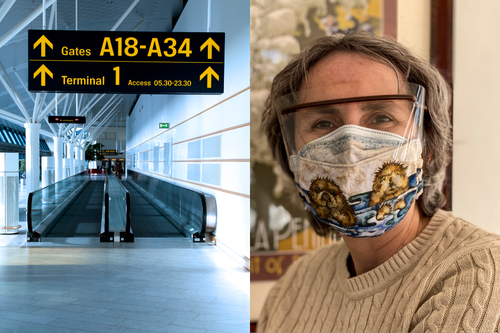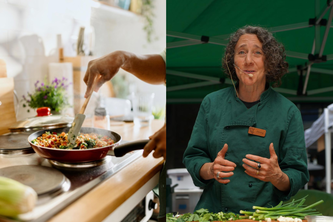
As seasons change and people seek to shake off pandemic fatigue, many are looking to take a break and get away. Although places are starting to loosen restrictions, infectious disease experts say it is still important to take precautions while traveling to help reduce the impact of COVID-19.
Jill Foster, MD, a professor of pediatrics in the University of Minnesota Medical School and pediatric infectious diseases physician with M Health Fairview, offers tips on how to stay safe during upcoming travel.
Q: What should people consider if they’re thinking about getting away?
Dr. Foster: There are two ends of the spectrum — you can either isolate yourself in your home and do nothing risky or you can just throw caution to the wind and enjoy your vacation as if it were still 2019. Where you fall between those two extremes should be based on:
- medical/vulnerability aspects of the people traveling,
- the baseline level of COVID-19 in the community for all the geographies involved,
- whether or not you (and the other travelers going with you) are vaccinated
- and, your tolerance of risk and ability to creatively problem-solve around the risk.
People need to really think through whether or not putting vulnerable people at risk – older relatives, someone with diabetes, someone getting chemotherapy – is worth the potential of becoming ill. Especially with spring all around us, everyone is anxious to hit the road, but we’re still not out of the pandemic yet. Numbers of cases are starting to rise again and the variant strains are concerning because they are transmitted more easily from person to person. I encourage people, though, to think ahead – what do you think you will regret in the future from what you do now?
Q: Should I wait to book my next travel destination until I have been vaccinated or is it becoming more safe for unvaccinated people to travel since others have already been vaccinated?
Dr. Foster: Traveling without having been vaccinated is risky. Risk of acquiring COVID-19 is based on:
- how many people out there are spreading it,
- how effective the virus is at spreading
- and, how protected the individual is who is exposed to the virus.
With others being protected, you’ve reduced #1, but with new, fast-spreading variants becoming the predominant form, #2 is more of a factor. That leaves you with #3, which is how much you are protected. Without having received a vaccine, you are only protected by a mask and social distancing, which is where everyone has been for the past year. It really is better to wait until you are vaccinated to journey out.
Q: If traveling by plane, what are your recommendations to be as safe as possible (e.g. should I double-mask, buy an N95 mask, fly shorter distances to limit my time on the plane, buy the seat next to me, etc)?
Dr. Foster: I suggest increasing your mask protection, even if you’re vaccinated, when in especially high risk settings - airplanes, crowded places where you can’t count on others to keep their distance, places where you’re going to be in prolonged contact with others inside without good ventilation, etc. The principle here is that you should predominantly be breathing air that comes through the mask, not air that comes around the edges of the mask. This is achieved by an N95 that fits tightly certainly, but there’s also some cheaper and easier options. I find that surgical masks don’t fit my face very well even if I twist the elastic loops. So, I wear a surgical mask with a cloth mask over it. It provides a tighter fit and, yet, I can still breathe comfortably. I also wear eye protection with a simple shield that covers my eyes that I bought online very cheaply.
Q: If I’m vaccinated, is it safe to travel with or see other people who are also vaccinated? If I’m vaccinated, is it safe to travel with or see people who are not vaccinated?
Dr. Foster: This part is tricky. We don’t have enough experience with vaccines yet to give a firm answer on this. We do have a sense that vaccines provide you with good protection when you have brief encounters as you go about your business – wearing a mask. It is likely that protection is less good when you are in prolonged contact with someone with COVID-19, especially in the type of casual settings where you aren’t masked – typically in households and when you are eating. Again, this depends on your medical status and your tolerance for risk. Treating someone else as part of your household (prolonged contact without masks) means that you have to believe that you both are in the 95% that have a good vaccine response and that neither of you had a significant exposure to someone who was transmitting COVID-19. Personally, I would travel with someone vaccinated, but I would not travel with someone unvaccinated. I would meet up with someone unvaccinated socially-distanced outdoors, but I would not share a room or a car ride.
Q: How important are viral variants when I’m considering travel?
Dr. Foster: Variant strains, as I noted above, increase transmission risk and, in some cases, may cause more severe disease. It appears that with the vaccines we are currently using and the variants that we know about, there is still reasonable antibody coverage. However, new variants are constantly emerging, and it is difficult for laboratories to keep up with the sequencing of them, even in the U.S. where we have sophisticated laboratories. In other countries, that may not be true and variants may have emerged that are not well covered by the vaccine, but it is unknown because testing was insufficient. My advice is to play it safe and stay domestic for a while. There will still be plenty of time in the future to wander further.
Jill Foster, MD, is a professor of pediatrics at the University of Minnesota Medical School and pediatric infectious diseases physician with M Health Fairview. Her expertise is in prevention and treatment of viral diseases, and in mobilizing public health and healthcare systems in the areas of prevention and screening.
-30-
About “Talking...with U of M”
“Talking...with U of M” is a resource whereby University of Minnesota faculty answer questions on current and other topics of general interest. Feel free to republish this content. If you would like to schedule an interview with the faculty member or have topics you’d like the University of Minnesota to explore for future “Talking...with U of M,” please contact University of Minnesota Public Relations at [email protected].
About the University of Minnesota Medical School
The University of Minnesota Medical School is at the forefront of learning and discovery, transforming medical care and educating the next generation of physicians. Our graduates and faculty produce high-impact biomedical research and advance the practice of medicine. Visit med.umn.edu to learn how the University of Minnesota is innovating all aspects of medicine.
- Categories:
- Health
- COVID-19
- Health conditions




